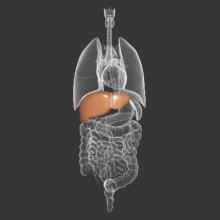PHILADELPHIA – To help ensure the best outcomes in patients with a range of liver pathologies, be alert for signs of neurologic and psychiatric abnormalities caused by hepatic encephalopathy, according to an expert.
“The patient doesn’t have to have cirrhosis or liver disease, but can just have portosystemic shunting with absolutely no liver disease, and still have hepatic encephalopathy,” Dr. Jasmohan S. Bajaj said at the meeting held by Global Academy for Medical Education and Rutgers, the State University of New Jersey.
Hepatic encephalopathy is believed to be due to dysbiosis caused by an altered bile acid profile, leading to an impaired intestinal barrier, which allows high levels of ammonia to circulate through the bloodstream, contributing to systemic inflammation and brain dysfunction, according to Dr. Bajaj, an associate professor of medicine at Virginia Commonwealth University and McGuire VA Medical Center, Richmond, Va.
“Ultimately, all the manifestations that we see are because of neuronal dysfunction, which is why the patient is depressed, anxious, sleepy, and has tremors,” Dr. Bajaj said.
Guidelines issued by the American Association for the Study of Liver Diseases stratify hepatic encephalopathy into four grades, the first being the difficult-to-detect subclinical form that is present in up at as many as 60% of patients with hepatic pathologies.
Because covert hepatic encephalopathy will likely progress to a more overt form, adversely impacting a patient’s quality of life and other outcomes, Dr. Bajaj emphasized the importance of testing for it.
One means of detection is to evaluate a patient’s response time using a modified version of the psychiatric Stroop test that measures cognitive dysfunction. Another is to consider collaborative care with a psychologist who can test for and diagnose cognitive impairment. Patients who select at least four items in the Sickness Impact Profile are “80% likely” to have covert hepatic encephalopathy, according to Dr. Bajaj.
Overt manifestations of hepatic encephalopathy include obvious signs of altered mental status, usually reported by the caregiver. Clinicians should consider as part of their differential diagnosis for overt hepatic encephalopathy whether the patient is diabetic, intoxicated, suffering an electrolyte disorder, or is experiencing intracranial bleeding or stroke, and should consider precipitating factors such as an infection, gastrointestinal bleeding, or an overdose of diuretics.
Avoid treatment decisions based on blood ammonia status superseding a patient’s mental status because “there are many people who are completely alert who have high ammonia levels,” Dr. Bajaj said. “When the patient presents at the emergency [department] with confusion but has a completely normal ammonia level, that is the only time ammonia levels are useful.”
Treating hepatic encephalopathy is possible by reducing the nitrogenous load in the gut with lactulose, rifaximin, probiotics, or laxatives, according to Dr. Bajaj, who noted that most overt hepatic encephalopathy patients will require inpatient evaluation, and that in cases with recurrent precipitating factors, patients should be considered for liver transplant suitability.
Dr. Bajaj said he receives grant support from Grifols, Norgine, and Salix.
Global Academy and this news organization are owned by the same company.
On Twitter @whitneymcknight


